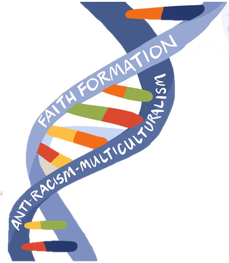 Ray Wiedmeyer, Beloved Community Communications Team The third part of the series on four practices of the Double Helix Model of Faith Formation and Antiracism Multiculturalism took place at Wellspring Wednesday on November 17, 2022. While the previous two parts of the series were set up to help participants like myself better understand the use of the double helix model in our personal lives, this session moved beyond ourselves to the use of the metaphor in our work among and beyond us—the work we do with each other and in the world outside Unity. To do this, participants sat in a large circle around a smaller circle in the center called “the fishbowl” made up Unity members willing to share their perspective on the “State of the Church.” Over the course of the evening, two groups occupied the center ring, and each took a turn sharing the ways they personally found connection to the church such as being involved in the choir, an outreach team, religious education, chalice circle participant, being a trustee, etc. In each case they were asked to reflect on the current state of the church, how things have changed or not changed over the past weeks, months, and years, and how we were doing as a congregation now in relation to their points of church connection. I found it fascinating and informative how many ways members found connection to the place we call Unity Church. The reflections of each group were then followed by reflections by KP Hong, Unity’s Minister of Faith Formation, and Alfonso Wenker of Team Dynamics, the organization helping us in our work to become more multiculturally competent. Their goal was to share how the double helix metaphor can be used to explore the connection between our faith and the antiracist multicultural work we claim as our goal. KP shared that our goal requires change and often change can be uncomfortable, even painful. Predictability is not necessarily what we should long for, and that if we forgo the same way of doing what we have always done, we may open the way for the positive change. What we know for sure is that real change does not come with some of the old ways of seeing and doing things. He also shared that this takes time. Unity can be the perfect place to do the work which often requires community, but not just any kind of community. It requires a covenantal community in which we do the work together thru hard times as well as, easy times; in which we stay in the room and do the work even when things get really difficult. Alfonso shared that what he was hearing in the individual responses was a sense of ambiguity felt by the congregation, which is a positive sign of a congregation moving along the multicultural continuum. To move out of our place of minimization, of our white privilege, we must be open to change. Being in and getting comfortable with change, with ambiguity, is helpful in this work. For me, this is where I began to see the value of the double helix metaphor. Our progressive, liberal faith holds the keys to becoming multiculturally competent if we embrace our ability to change. Our competency work and our work to see white privilege disappear is the work of creating Beloved Community that we often talk about in our Unitarian Universalist faith. If we are blind to the connection, we may end up shortchanging ourselves and the change we wish to see.
0 Comments
Leave a Reply. |
Topics
All
Beloved Community ResourcesUnity Justice Database
Team Dynamics House of Intersectionality Anti-Racism Resources in the Unity Libraries Collection Creative Writers of Color in Unity Libraries The History of Race Relations and Unity Church, 1850-2005 Archives
July 2024
Beloved Community Staff TeamThe Beloved Community Staff Team (BCST) strengthens and coordinates Unity’s antiracism and multicultural work, and provides opportunities for congregants and the church to grow into greater intercultural competency. We help the congregation ground itself in the understanding of antiracism and multiculturalism as a core part of faith formation. We support Unity’s efforts to expand our collective capacity to imagine and build the Beloved Community. Here, we share the stories of this journey — the struggles, the questions, and the collaborations — both at Unity and in the wider world.
The current members of the Beloved Community Staff Team include Rev. Kathleen Rolenz, Rev. KP Hong, Rev. Lara Cowtan, Drew Danielson, Laura Park, Lia Rivamonte and Angela Wilcox. |